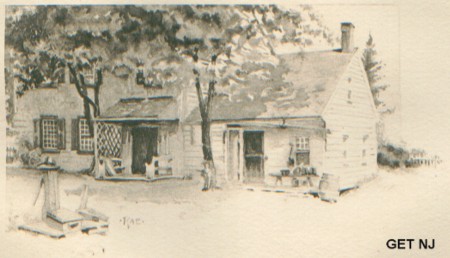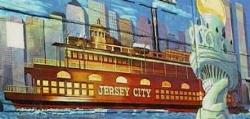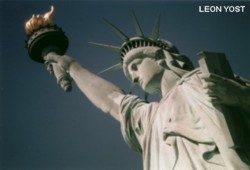 |  |  |
|
| ||
 |  |  |
 |  |  |
|
| ||
 |  |  |
|
|
|
Historic Houses
Freehold
From Historic Houses of New Jersey by W. Jay Mills, 1902 |
 |
ONE of the best preserved and
architecturally beautiful houses
in Freehold is the Hankinson
Mansion, which Sir Henry Clinton, on his retreat from Philadelphia, made his head-quarters
on June 27, 1778, the day before the battle of Monmouth. It was erected y a member of the Hankinson family
about 1755, and is just beyond the crowded portion
of the village, on the "old Burlington Path." The
quaint ornamental cornice is the same as that on the
famous Tennent Church, built three years earlier, and
but a few miles distant.
At the time of Sir Henry Clinton's occupancy it was
owned by a Mrs. William Conover, an elderly dame
living there with her slaves. On learning that the British
were advancing, she, like other prudent housewives in
Freehold, buried her plate and china by the lilac and
rose-bushes in the garden and secreted her fine furniture in a wood a few miles distant from the house. On the
morrow, so the story goes, gazing with trepidation from
the windows of the chintz-hung drawing-room, she spied
the enemy in a solid red column advancing towards her
dwelling. Faint with horror, but secretly pleased that
her choice possessions were safe, she folded her hands
and resignedly awaited their coming.
Sir Henry Clinton on this occasion played the wolf
in sheep's clothing, for he calmed Mistress Conover's
fears, and soon cajoled her into sending for her furniture
and other belongings necessary for his comfort, which
he afterwards permitted his men to loot.
Dr. Thomas Henderson, her nearest neighbor, writing,
shortly after the Revolution, in The jersey Gazette, of
the harsh treatment Mrs. William Conover and many
people of Monmouth received at the hands of the British,
says:
With regard to personal treatment, she was turned out of her bedroom and obliged to lie with her wenches, either on the floor, without
bed or bedding, in an entry, exposed to the passing and repassing of all,
or sit in a chair in the milk-room, too bad for any of the officers to
lie in.
Some years after Sir Henry Clinton had been driven
from the battle-field of Monmouth, and the trusting old
lady he had forced to sleep in her draughty milk-room,
surrounded by her black wenches, was at rest in the
Freehold church-yard, the Hankinson Mansion was sold
to Captain William Forman, a member of the noted
Monmouth Forman family, who had served in the navy
during the war, and was then engaged in the lucrative
East-India trade. Captain Forman was a jolly bachelor
and one of the traditional sea-dogs of the old school.
He brought with him his younger brothers and sisters,
and a new era began for the old house.
In the large rooms and wide halls, once filled with
stern-faced men on the eve of battle, light-hearted girls
in embroidered gowns of the Empire period and youths in
blue coats, yellow breeches, flowered vests, and variously
colored and sometimes striped stockings, danced, or
tried to dance, the newly imported waltz. Early
nineteenth-century society could not quite accustom itself to giving up the stately Sir Roger de Coverly, the
minuet, the Virginia reel, and the older hemp-dressers, for
"the funny new favorites," as a Monmouth girl wrote
in her diary of the waltz and the constitution polka.
On the simply carved mantels of the Hankinson
Mansion costly " heathen bric-a-brac," as the Freehold
neighborhood used to speak of its china vases and ornaments, added to the richness of the rooms. For the table-service the captain brought home with him on one of
his trips two sets of the fine India china so much in
use in the old days.
What fond beatings stirred the hearts of the Freehold maidens when the " Saucy Betty" or the " Swift
Sally" was due in port, and the dreams of wonderful fabrics and gewgaws were about to come true.
Great was the excitement in the chintz parlor when
the captain and his chests arrived on the coach from
Amboy, for people made more over home-comings in
those days, when travel was not general.
One can picture the happy family embracing the
wanderer, and holding him at an arm's length to make
sure he had really returned, and the next minute fumbling with the locks of his sweet-smelling foreign boxes,
impatient to peep at the presents. On such occasions
we see the dapper sea-captain with his genial weather-beaten face aglow with smiles, surrounded by his eager
females, a veritable Alexander Selkirk, proud monarch
of all he surveyed. Then soon the friends begin to
arrive, – the Henderson girls from over the way, the
Vredenburghs, Breeses, Freneaus, Piatts, Lippencotts,
Littles, Denises, Vanderveers, Englishes, Throckmortons, Gastons, Perrines, and all the gentry of the Freehold
neighborhood ; the Forman cousins, from Violet Bank,
out of Freehold, in the old coach which has outlived
halt a century, and the Bergens, from Bottle Hill.
What laughter, kissing, and rejoicing as they sit about
the dining-room on spindle-legged chairs and hear of
the captain's latest adventures, as they taste the jellies
and whipped sillabubs, and sip the seasoned port and the
"stewed Quaker," so popular in Monmouth households, (Stewed Quaker was a Freehold drink of hot cider, with a roasted
Monmouth red floating on top of the mug or bowl.)
In old Freehold letters there are many glimpses of
early Monmouth society. A letter dated August, 1809,
written by Miss Sally Holmes, a Jersey girl then visiting
New York City, contains a charming display of Jersey
loyalty. She writes:
One of the Monmouth captivating gentlemen was a
wit by the name of Bergen. With his "full flow of
flowery imagery and constant stream of mind" he was
always a welcome addition to the gatherings at Captain
Forman's. A friend of Miss Holmes's, whose sister had
been much in his company, wrote jestingly to her:
The Freehold neighborhood, in the heart of Jersey,
formed a little world of its own in the old days.
At one time, during the War of 1812, twenty officers
took lodging in the town. When Captain James Lawrence visited there the gaiety was at its height. Then
it was that Captain Forman's sisters wore huge mull
bonnets, the envy of every maid who sang good Whitefield's "gay, theatrical tunes" at Tennent. The children
of some of the first families decorated with flowers the
path to the house where he stopped, and the gay roystering blade of a seaman over at the Hankinson
Mansion asked his friends to drink the health of young
Lawrence with many a bottle of old jewel-colored
wine.
The sea was the one grand passion of Captain Forman's
life ; and to constantly remind himself of its changeful
beauty when on land he had the walls of his parlors and
bedrooms painted with marine views, a few of which
still remain undestroyed in the Mansion.
His friend the poet Philip Freneau addressed to
him his amusing and witty lines on "The Sea-Faring
Bachelor": –
After his removal, the old Hankinson Mansion passed
through many hands, but is still in a fine state of presevation, and is one of the most picturesque houses in
Freehold, on the road which the wags of the town used
to say was "as straight as the road to perdition."
Up in the large attic a long musty row of the captain's trunks and foreign boxes still remain. They are
a company of silent ghosts, for their faintly-perfumed
depths are haunted by memories of love and anticipation
and the fair faces of Freehold maidens that once bent
over them.
Many a brave young Englishman bearing an historic
name slept his last sleep in the old Hankinson Mansion
that night. Such is the fortune of war. We read in
the list of British officers killed or wounded at the
bloody battle of Monmouth, Lieutenant-Colonel Hon.
H. Monckton, Captain Gore, Lieutenants Kennedy and
Vaughan, Colonel Trelawny, Captain Desborough, and
many others, all descendants of noble lines.
After he (General Clinton) had been for some time in her house,
and taking notice that most of the goods were removed, he observed that
she need not have sent off her effects for safety, that he would have
secured her, and asked if the goods could not be brought back again.
The old lady objected, but upon the repeated assurance of General
Clinton in person that they should be secured for her, she consented, and
sent a person he had ordered, along with a wagon, to show where they
were secreted. When the goods were brought to the door, which was
in the latter part of the day, the old lady applied to General Clinton in
person for permission to have them brought in and taken care of, but he
refused, and ordered a guard set on the goods. The morning following,
refused, and ordered a guard set on the goods. The morning following,
the old lady finding most of the goods plundered and stolen, applied to
him again for leave to take care of the remainder. He then allowed her
to take care of some trifling articles, which were all she saved. . . .
The style of living here, the customs, manners, and general subjects of conversation are very disappointing. The style is not as elegant
as I expected to have seen, and the most sensible and witty lady here
would not be observed in Monmouth except for her satire and folly.
The beaus are in no way captivating, and although they abound in numbers, they are much inferior to the Monmouth gentlemen. I could not
recommend it to any of my friends to come here, unless it should be to
make a fortune, that they might return to Jersey to enjoy it.
You have enjoyed so many nuptial gayeties the past season and have
recently, with an agreeable youth, advanced so far over the fertile plains,
and through the pleasant and beautiful villages of Essex, and over the
vales and mountains of Morris, Sussex, and Hunterdon, that Time has
rolled on his ceaseless course, not like the streams of Monmouth, wandering, meandering smoothly through the meads and fields, but running,
rolling, rushing like the mountain torrents down the sides of lofty Allegheny. When on the mountain's top you cast your eyes around and saw
hills and vales, woods and cultivated fields, did not a fine fall flow of
pleasure come rushing on your soul? But you have descended from
these aerial realms, and again feel the anxieties and cares mortals are subject to.
Among the belles of Freehold at the beginning of the
last century the name of Sarah Woodhull* is prominent.
She married William Gordon Forman, a descendant of
High Sheriff Samuel Forman, and a relative of Captain
William Forman, and brought him a large fortune.
They removed to Natchez, where he soon became
Speaker of the first House of Assembly in Mississippi.
One of the Henderson girls wrote shortly before the
Forman's left Freehold, in September of 1809:
The portraits of Mr. and Mrs. William 'Gordon Forman, by an
unknown artist, are in the possession of Mrs. Alice Forman, of Freehold. Mrs. Forman's home contains many interesting antiquities. A
beautiful mirror of the reign of Queen Anne adorns her drawing-room,
and two pastoral scenes by Benjamin West, purchased at an auction over
seventy-five years ago for a small sum, embellish its walls. She owns
the chair used by Washington when he dismounted after the battle of
Monmouth.
The "hand of providence" did not smile on the
venture of the Formans. Mrs. Forman died shortly
after their arrival at Natchez. A year later Mr. Forman
started for her New Jersey home to leave his young
daughter with her grandparents. Reaching Louisville,
Kentucky, he was stabbed to death in his bedroom at the
Gault House by negroes, who hoped to find a sum
of money on his person. His fortune was in script, and
proved useless to his murderers.
Last week I spent with Mrs. Major Forman (William Gordon
Forman). She was much engaged in necessary preparation for her
journey and stay in Natchez. Mrs. Woodhull told me that she felt reconciled to her daughter's going, now that it appeared to her that the
hand of providence was in it. She bears it with uncommon fortitude.
She was as cheerful and her spirits as good as I have ever seen them.
Mrs. Forman says that she can support herself in the trying scene if it
does not overcome her parents, but to see them drooping and sinking with
grief and distress on her account will be too much for her to bear.
Sabra, her black mammy, has consented to go with them, which is a
great comfort.
The fair and loving Myrilla could not have pleased
the captain's fancy, for he died a bachelor. Freehold was
his home for many years, until the death of his mother,
who before her marriage was a Miss Wickoff. He then
removed to the Kearny House, at Keamy-Port, now
Keyport, where his sister Mary presided over his hospitable abode.
So So long harrass' d by winds and seas,
'Tis time, at length, to take your ease,
And seek a bride, for few can find
The sea a mistress to their mind.
In all your rounds, 'tis wond'rous strange
No fair one tempts you to a change.
Madness it is, you must agree,
To lodge alone till forty-three.
Old Plato own'd, no blessing here
Could equal love-if but sincere;
And writings, penn'd by heaven, have shown
That man can ne'er be blest alone.
* * * *
If Neptune's self, who rul'd the main,
Kept sea-nymphs there to ease his pain;
Yourself, who skim that empire o'er,
May surely have one nymph on shore.
Myrilla fair, in yonder grove,
Has so much beauty, so much love,
That, on her lip, the meanest fly
Is happier far than you or I."
 Your Ancestors' Story |
 Bruce Springsteen's Jersey Shore Rock Haven! |

|
UrbanTimes.com |